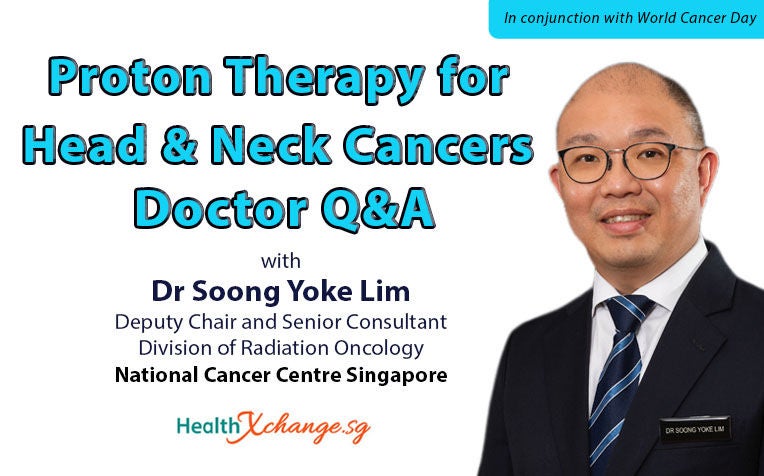
Ask Dr Soong Yoke Lim any question about head and neck cancers, and the use of proton therapy in treating cancers.
In conjunction with World Cancer Day, Dr Soong Yoke Lim, Deputy Chair and Senior Consultant from the
Division of Radiation Oncology at
National Cancer Centre Singapore (NCCS), a member of the SingHealth group, answers your questions about
head and neck cancers, and the use of proton therapy in cancer treatment. This Ask The Specialist forum has closed. Thank you for participating. Scroll down to see all questions and answers submitted for this forum. |
At least 800 new cases of head and neck cancers are diagnosed in Singapore yearly.
Cancers occurring in the head and neck region are categorised together as
head and neck cancers. They form a diverse group and include cancers of the skin over this region, cancers in the sinuses, nose, mouth, throat, thyroid and salivary glands.
Those at risk of head and neck cancers include:
Males over the age of 40
Those infected with cancer-causing subtypes of human papillomavirus (HPV) and Epstein-Barr virus
Those who engage in:
a) Alcohol and tobacco use (smoking or chewing) are the two most important modifiable risk factors for head and neck cancers
b) Chewing paan (betel nut leaf)
c) High-risk sexual practices such as oral sexThose who have had exposure to:
a) Radiation to the head and neck region
b) Occupational exposure to asbestos or synthetic fibres
To know how to do a simple self-check for head and neck cancers, read this article.
Treating cancers with proton therapy
Proton therapy is an advanced type of radiation treatment that targets cancer cells using positively charged subatomic particles called protons.
The unique physical properties of protons enable tumours to be more precisely targeted compared to the x-rays used in conventional radiotherapy.
This minimises damage to nearby healthy tissues and organs and therefore results in fewer treatment-related side effects.
NCCS is the only public healthcare institution in Singapore to offer proton therapy.
Currently, proton therapy may be appropriate for some patients for conditions such as brain tumours, head and neck cancers, lymphoma and childhood cancers.
About Dr Soong Yoke Lim
Dr Soong Yoke Lim is a Deputy Chair and Senior Consultant in the Division of Radiation Oncology at the National Cancer Centre Singapore. Dr Soong received his medical degree from the University of Melbourne in 2000. He subsequently trained at the Department of Radiation Oncology, National Cancer Centre Singapore and underwent further training in University College London Hospital in 2007.
He subspecialises in the radiotherapy management of patients with Gynaecological and Head and Neck cancers. Dr Soong has interest in cancer survivorship and is the medical advisor for the Nasopharyngeal Cancer (Nose Cancer) Support Group at NCCS.
Questions and answers on head and neck cancers
1. Question by Nadirah
Hi Doctor,
Are all nodules on the neck cancerous?
Thank you for your advice.
Answer by Dr Soong Yoke Lim
Not all nodules on the neck are cancerous. It may also be due to other causes such as infection, inflammation or benign lumps.
However, without further testing, it is often difficult to differentiate cancerous nodules from non-cancerous ones. It is best to see your doctor for medical advice if you have non resolving lumps in the neck.
2. Question by Kelly
Dear Doctor,
I have constant pains on one side of my tongue and inner lip skin, with ulcers, swelling, numbness, and sometimes bleeding etc.
I did a biopsy 5 years ago and the result was good. However, I think my condition is not getting better throughout these years.
Would you advise that these are cancer symptoms?
Thank you so much.
Answer by Dr Soong Yoke Lim
Pain, ulcers, swelling and bleeding may be symptoms of cancer. However, non- cancerous conditions may also have similar symptoms. It is sometimes difficult to differentiate cancerous from non-cancerous ulcers, swelling and bleeding without further testing. It is best to see your doctor for medical advice if you have such symptoms.
Ref: H24













 Get it on Google Play
Get it on Google Play